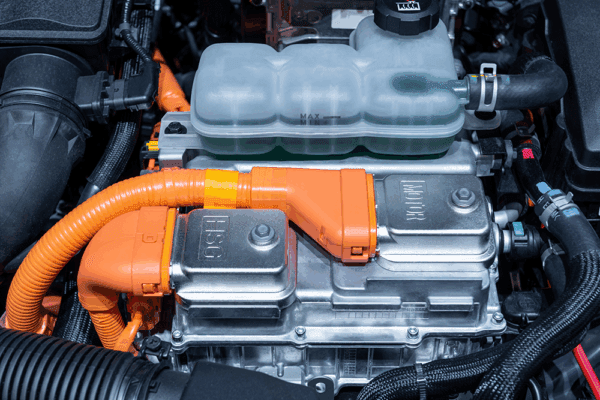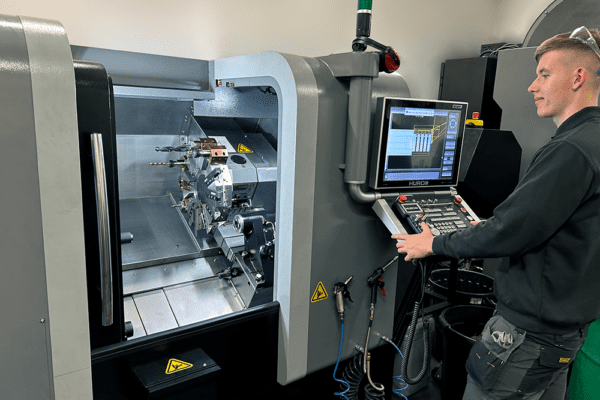
Bloom-in-Box Expands Sustainable Production with FANUC’s Energy-Efficient ROBOSHOT Machines
|
Getting your Trinity Audio player ready...
|
FANUC’s best-in-category energy efficiency claim for its ROBOSHOT injection moulder series has been validated in a real-life installation at sustainable plastic product manufacturer Bloom-in-Box. The ROBOSHOT S150iA has consistently used 33% less power than the other all-electric machines at the injection moulder’s Burscough facility since it was installed in 2022. This market-leading energy performance has prompted Bloom-in-Box to purchase two further ROBOSHOT machines, allowing the company to expedite its expansion plans whilst reducing its carbon footprint.
“We bought the new ROBOSHOT machines to enable us to cope with the increased volumes of work we were dealing with, but they are far more than just a means of expanding our capacity – they are a long term investment that will be crucial as we move towards a lower carbon future. When it comes to energy performance, these machines are out of this world,” says Tom Reardon, Production Coordinator and Robotics Engineer at Bloom-in-Box.
Responsible manufacturing
Bloom-in-Box has long been an advocate of electric moulding machines on the basis they use up to 80% less energy than their hydraulic counterparts. This aligns with its ethos of responsible consumption and production: a commitment to creating plastic products with more than one life drives the company’s design and manufacturing activities. Bloom-in-Box’s flagship product – the Bloomie floristry box – is made from 99% recycled material and is 100% recyclable. Any boxes that mould incorrectly are chopped up, passed through a grinder and made into security spikes. Other products made by the business include laundry pegs, scoops and measures.

When Bloom-in-Box purchased its first ROBOSHOT in 2022, it was working towards becoming carbon neutral. The company had invested in a 40 kWp solar system that fed directly into its factory and wanted an injection moulding machine that could be powered exclusively by solar. The ROBOSHOT range stood out as the obvious choice, thanks to a combination of FANUC’s proprietary servo technology and smart energy recovery. It consumes 10-15% less power than the average all-electric machine, making it the most energy-efficient injection moulding machine available today.
Driven by data
In the two-and-a-half years that have passed since the machine was installed, the ROBOSHOT’s best-in-class energy efficiency has been borne out by data collected by Bloom-in-Box. The 150T clamp force ROBOSHOT S150iA runs at 2.5-3kW per hour for a six-second cycle (the longer the cycle the less energy consumed). This is 33% less power than their other all-electric machines, which run at 3.5kW per hour or higher. In real terms, it equates to an annual energy saving of 4,000kWh+ per year.
The ROBOSHOT S150iA has mainly been put to work on moulding polypropylene, which is less energy-intensive to mould than many other plastics due to its low melt viscosity. If the machine was deployed in applications involving plastics such as nylon and ABS, the savings would be even greater.

“We carried out a study on a different application in which the ROBOSHOT ran at 3kW per hour, compared with a rival all-electric machine, which ran at 6kW per hour. This would equate to a difference of 26,000kWh over the year, which, at current energy prices, would result in a £7,000 saving,” says Tom.
Prioritising energy efficiency
For Bloom-in-Box, the ROBOSHOT’s outstanding energy performance is a cornerstone of its sustainability strategy. The company was originally working towards carbon neutral production but has shifted its focus to investing in on-site energy reduction instead, believing it can make more impact with this approach.
“When you are carbon neutral, you offset the carbon you make to a company, organisation or project around the world that is carbon negative. But when you delve into it, some of these projects won’t yield a carbon reduction for another 25 years. I felt that the money used to do this would be better spent on reducing our own energy consumption on site, in a bid to improve the business’s footprint,” explains Tom.
He continues: “The FANUC ROBOSHOT is a huge part of reducing our carbon footprint as a result of its superior energy usage; it is much lower than other machines on the market and lower than the other machines we have on site.”
Meeting increased demand
In line with this strategy and in the face of increasing demand, Bloom-in-Box has invested in two further ROBOSHOT machines to expand its capacity. This is being driven primarily by two applications: scoops and measures from the booming active nutrition market and a compostable product for clay pigeon shooting that Bloom-in-Box has designed and patented.
The ROBOSHOT S50iB was installed in August 2023, and Bloom-in-Box says this smaller machine runs at 2kW per hour, generating even larger energy savings than the original S150iA. The company’s most recent purchase, a ROBOSHOT S100iB was delivered at the start of 2025.
“We chose these two machines because of the energy savings we know we can expect from FANUC, along with their ability to run our existing products as well as new lines we are working on,” notes Tom.
Benefits for life
Besides generating cost savings through reduced power consumption, the ROBOSHOT machines also keep Bloom-in-Box’s capacity charges low.
“We only run on a 100 Amp supply, which is approximately 60kVa. A lot of injection moulders require 250kVa and they pay high capacity charges for having that supply, regardless of consumption,” said Tom.
But energy efficiency is not the only reason why FANUC’s injection moulders are a sustainable choice for Bloom-in-Box – FANUC’s promise to provide lifetime support on its products is also a major factor.
“FANUC machines are built for life, with on-the-shelf spare part availability guaranteed for 25 years and beyond that, lifetime repairs. This means that we are not having to replace machines every few years, which is not only beneficial from a cost point of view but also lessens environmental impact through reduced raw material consumption,” says Tom.
Read more news from FANUC here.

FANUC
+44 (0) 24 7605 3000
Website
Email





